Over the years, Samsung has delivered a broad range of high-fidelity audio solutions for a variety of experiences and living space set-ups. In a time when consumers have access to an endless range of content, Samsung’s devices, televisions and viewing solutions are playing a role in more and more facets of people’s lives.
Earlier this year, Samsung Electronics introduced the world’s first 11.1.4 channel soundbar, which helps bring consumers right into the midst of the action with rich, room-filling sound. And it has been Samsung’s relentless audio innovation over the years that has helped bring about the high-end technology and consumer experiences we enjoy today. This innovation is underpinned by a focus on research and development and emerging content formats, as well as a willingness to adapt to consumer feedback and behavior.
In 2016, Samsung released its HW-K950 soundbar, which transformed static sound into three-dimensional formats to allow users to enjoy sound that moves up and down and from left to right. Since then, Samsung has invested in expanding these features, which have now been enhanced to deliver technology that measures room acoustics and delivers richer auditory experiences and sleeker designs. Below, Samsung Newsroom takes a closer look at the captivating experiences delivered by the new soundbar’s upgrades and technological features.
The Inaugural 11.1.4-Channel Soundbar
The newly-released HW-Q950A soundbar delivers a more advanced 11.1.4–channel setup to provide a more vivid surround sound effect in action–packed scenes like those involving car chases and airplanes in flight. By using only four speakers (a main soundbar speaker, a subwoofer, and two rear speakers), Samsung’s 2021 HW-Q950A soundbar produces a standard of high-quality sound that other premium AV receivers would need double the power and number of inputs to match.
Just a few years ago, only high-end, multi-component home theater setups allowed for immersive sound experiences that produced 3D surround sound. But now, with the release of Samsung’s HW-Q950A soundbar and its 11.1.4–channel sound, users can enjoy realistic audio with only their soundbar.
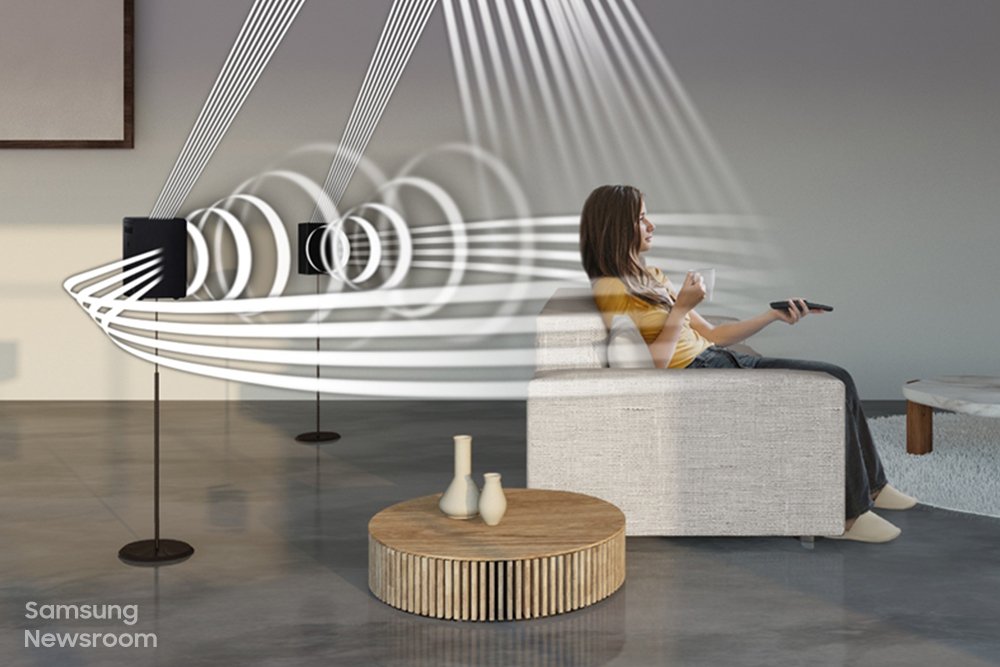
But what exactly do these channel numbers mean? A two-channel system consists of a stereo with two speakers on the left and right, while a three-channel system adds an additional speaker to this two-channel setup for crisper audio output. 3.1–channel setups feature an additional subwoofer (the .1 channel) for low frequency sounds, while 5.1-channel systems add rear speakers to deliver enhanced sound that extends behind viewers. The 5.1.4–channel setup seen in soundbars includes two additional height channel speakers that produce three-dimensional surround sound to deliver the sound of objects moving off-screen.
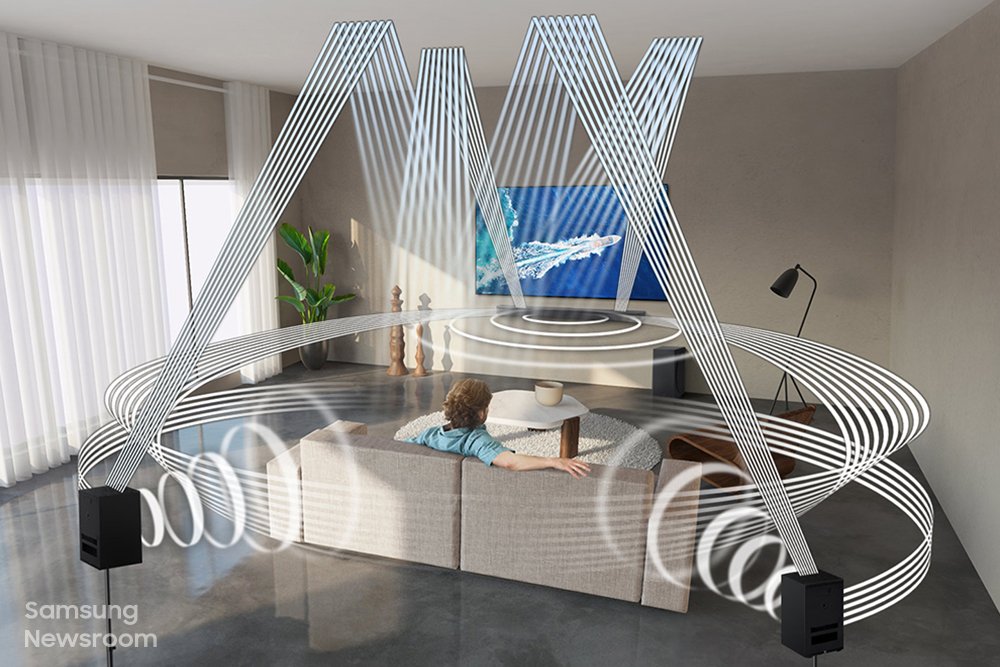
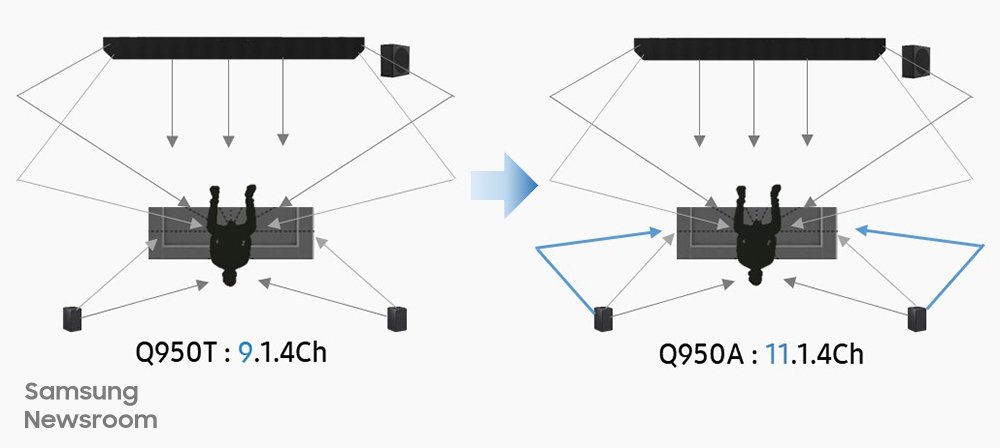
In 2016, Samsung launched the HW-K950 soundbar, which was the first to deliver a 5.1.4–channel setup and three-dimensional surround sound. Then, the HW-N950 model released in 2018 delivered 7.1.4–channel sound by adding a surround channel to the side of the soundbar. Today, the HW-Q950T model delivers a 9.1.4–channel system by adding a wide surround channel that delivers sound from the front and sides of the viewer for a 360-degree audio experience.
Improving Sound Through Calibration
In typical home viewing setups, depending on the size of the room, sounds often reflect off walls, ceilings and floors, which can cause the audio to sound different than intended. In order to reduce such disparities, Samsung has developed the SpaceFit Sound feature, which harmonizes audio levels and contributes to sounds being delivered as they were originally developed in production.
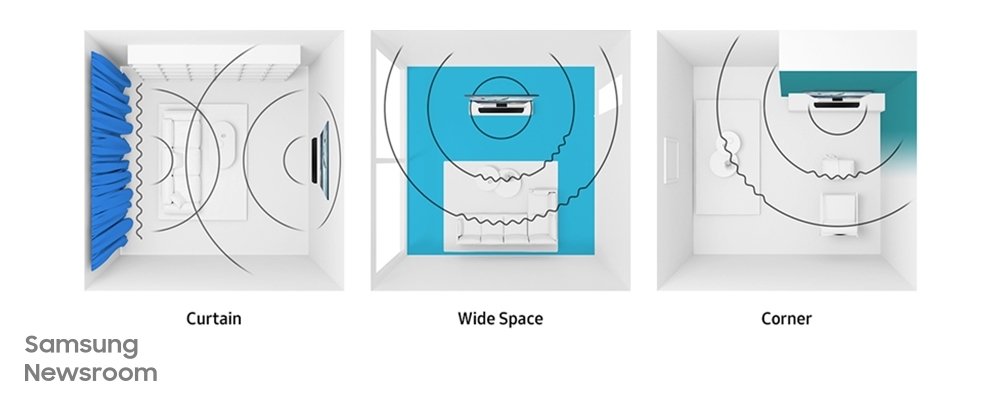
Recognizing the size and reverberation characteristics of the room, select Samsung soundbars utilize the built-in microphone and DSP in QLED TVs to deliver optimal sound. This collaboration feature is available in soundbar models HW-Q700A and above and QLED TV models Q70A and above from this year.
What’s more, the Samsung soundbar models above the HW-Q900A also include the Auto EQ feature, which analyzes surrounding spaces with a built-in microphone mounted on the subwoofer instead of using the TV microphone. This offers optimized sound by calibrating excessively amplified low frequencies and sounds that are offset by other audio. This feature doesn’t require use of an active TV microphone, is available across all TV models and is an ideal fit for both older and newer televisions.
S Series Soundbars Add Central Speaker for Room-filling Sound
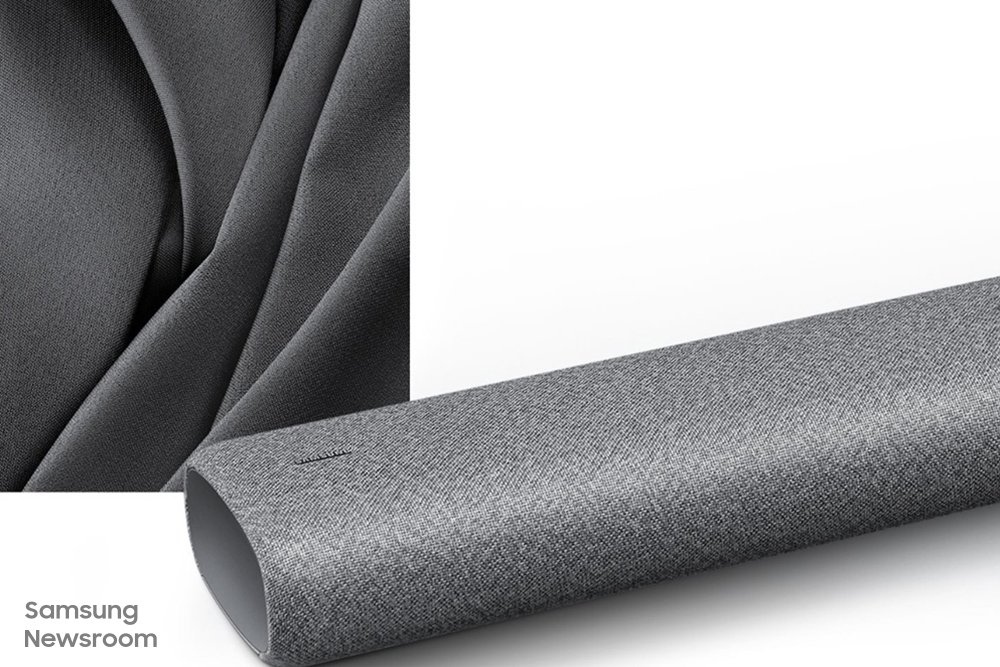
The new S Series Soundbar includes a central speaker and now boasts five channels compared to the four-channel systems in existing models.
This series, which is popular with consumers for its minimalist design and smooth finishes, is the perfect addition to any living room. When groups of viewers watch TV without a central speaker, those sitting near the edges of the room can often only hear the sounds closest to them. Now, with the addition of the central speaker, consumers can enjoy room-filling, immersive audio that replicates a cinema-style environment.
Going forward, Samsung Electronics is also planning to incorporate its Q-Symphony technology in an increasing number of its products. This technology provides realistic 3D sound to allow consumers to enjoy even more immersive audio across a broad range of content.



![[Invitation] Galaxy Unpacked February 2026: The Next AI Phone Makes Your Life Easier](https://stuffmotion.com/wp-content/uploads/2026/02/Unpacked-Invitation-Main-KV-e1770762621867-218x150.jpg)













![[Interview] Notes on Seundja Rhee: Translating Nature’s Rhythms Into a Language of Light and Form](https://stuffmotion.com/wp-content/uploads/2026/01/Samsung-TVs-and-Displays-Samsung-Art-Store-Seundja-Rhee-Interview_Thumb728-218x150.jpg)

![[Interview] Erwan Bouroullec Blends Sound and Space With Music Studio](https://stuffmotion.com/wp-content/uploads/2026/01/Samsung-TVs-and-Displays-Bouroullec-Interview_Thumb728-218x150.jpg)

















